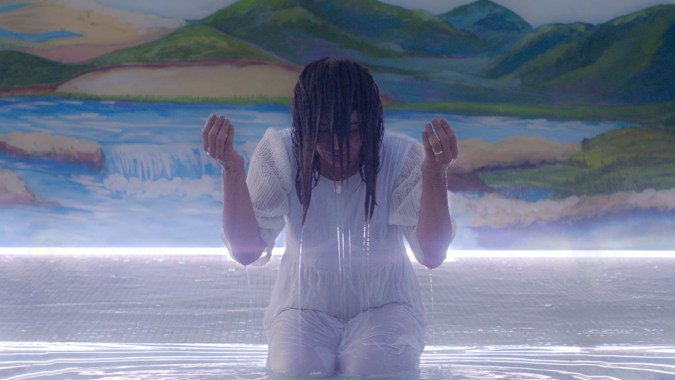Imagine a world where you can visit a priest in a drive-through. Where you need to fill out endless genetic-based paperwork to finalize a divorce. And where a church-run marital counseling session doubles as a swingers sex club. To those familiar with Gabriel Mascaro’s filmography (August Winds, Neon Bull) this near-future vision of Brazil won’t seem too farfetched. Indeed, the naturalistic performances and the drab world of offices, neon-tinged churches, and simple yet impressive technology that runs through Divine Love locates us squarely in a future world that’s just shy of being implausible. That’s also what makes it so prescient; it’s a movie as much about present-day concerns as it is about future-driven fears.
It is 2027 and when women like Joana (Dira Paes) walk through sensors that are located at building entrances, they alight with messages about their marital status and their sexual reproductive states. Joana’s reads “Married”; she wishes it would also read “Pregnant.” She’s been striving (and praying) for a long time to conceive a child with her partner Danilo (Julio Machado). It’s not for lack of trying. Using the same kind of lustful and unflinching gaze he’s used in previous work, Mascaro makes us privy to their passionate lovemaking in long static takes, where you can see every bead of sweat slowly drip from their writhing bodies. Theirs is an athletic and all-too vigorous sex life. But despite their zeal, they can’t seem to get pregnant. They’ve exhausted all kinds of medical exams and treatments. The latest is a contraption that straps Danilo upside down and beams his crotch with some kind of laser technology (it looks like he’s indoor-tanning his penis).

But Joana is a devout woman and so the bulk of her energy is spent on calling on the Lord to deliver her a baby. She feels entitled to one. She spends her days trying to get couples who are filing for divorce to reconsider (often by miring them in needless bureaucratic demands), claiming each discarded divorce a personal victory. It is her faith which also brings her and increasingly wary Danilo into the Divine Love church. There, couples share their issues and recite pertinent Bible passages before giving way to much more intimate interactions — the kind that are just as steamy and sweaty and blush-inducing as those including just the couple at hand. And yes, they’re long enough to have you squirming in your seat as you witness a communion that only a sensuous director like Mascaro, attuned to fleshly delights, can offer without it feeling like titillating pornography.
But when it seems like Joana’s prayers have been answered, the film’s pop-colored vision of a futurist faith is called into question, forcing Joana to reassess everything she believes in. Has she been offered a miracle? Can her marriage withstand such a gift? Might anyone believe her sudden good luck? The questions run through Joana’s head as she scrambles to keep her wits about her. This allows Mascaro to muse about everything from blind devotion and faith-sanctioned adultery to bureaucratic overreach and marital despair. On paper all these various elements sound as if they’d jockey for attention and clash with one another. But in Mascaro’s hands, they merely feed into each other, as if he’d found a way to speak in ways both secular and divine about love in all its messiness. Much of that falls on Paes’ performance, which is perfectly in tune with Mascaro’s wild ambitions; she’s his blessed María, as ethereal and grounded as that most beloved of religious icons, the one who gives birth to our kid narrator, whose voice over sets the tone for this parable of contemporary Brazil.

Divine Love screened as part of the Sundance Film Festival




